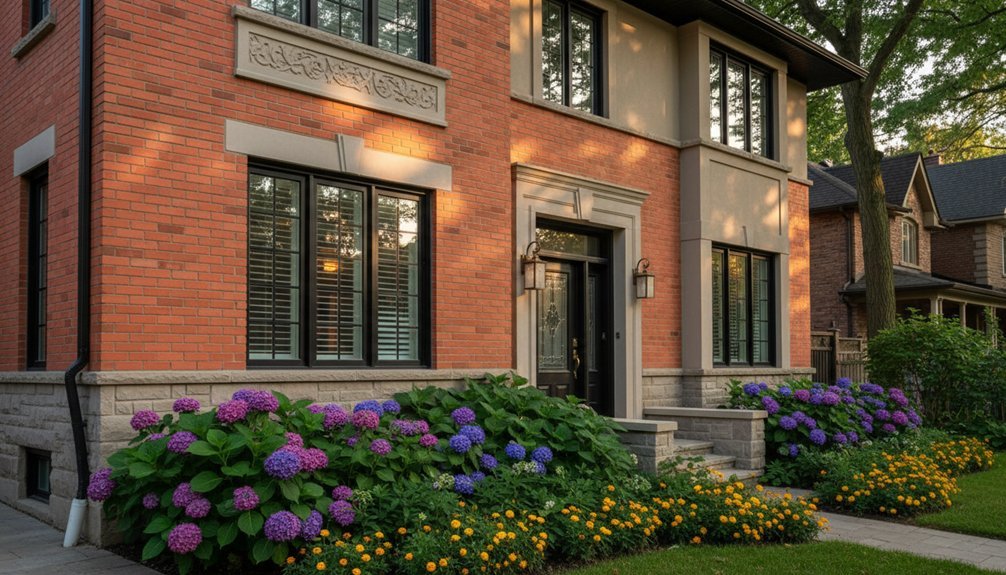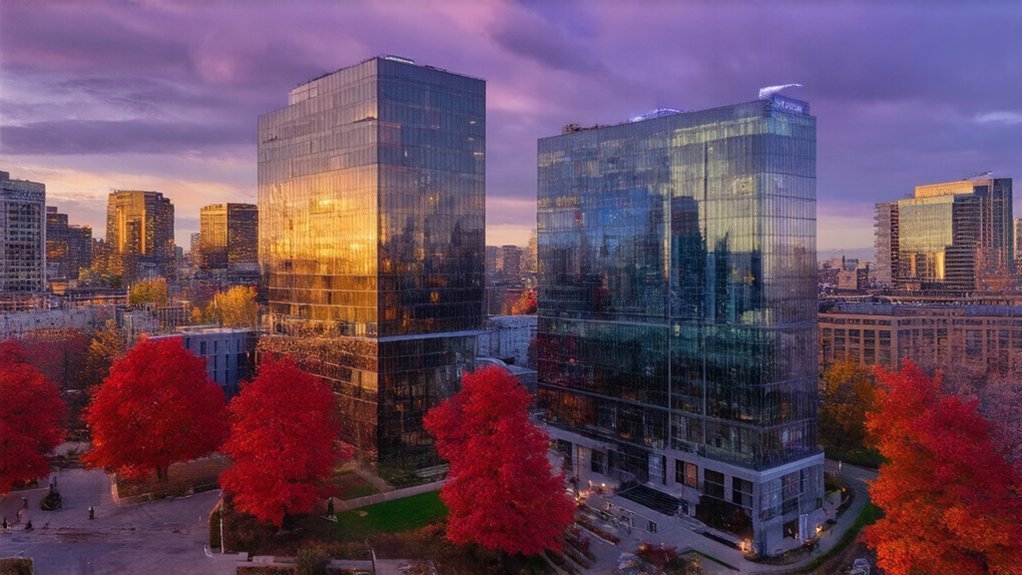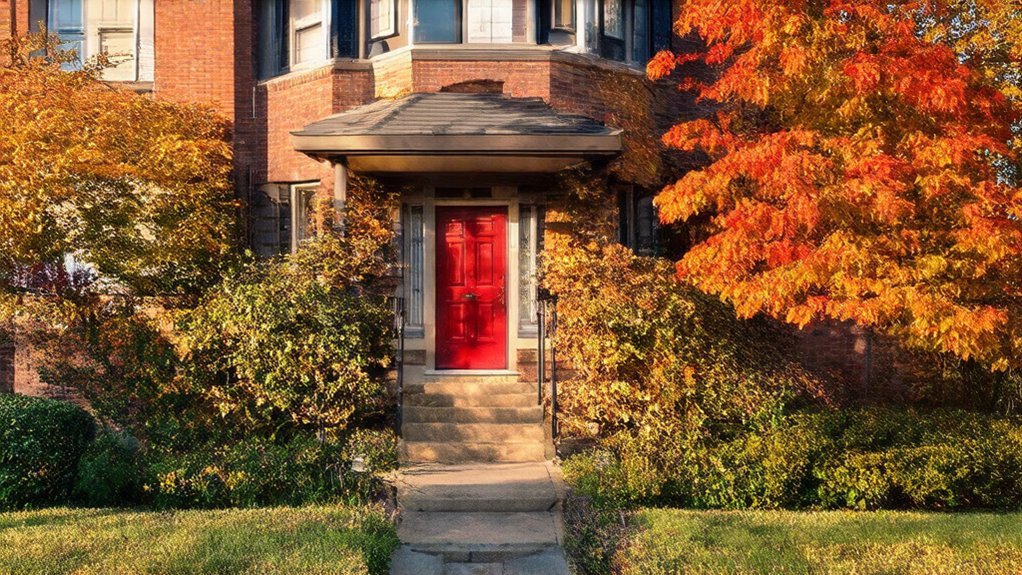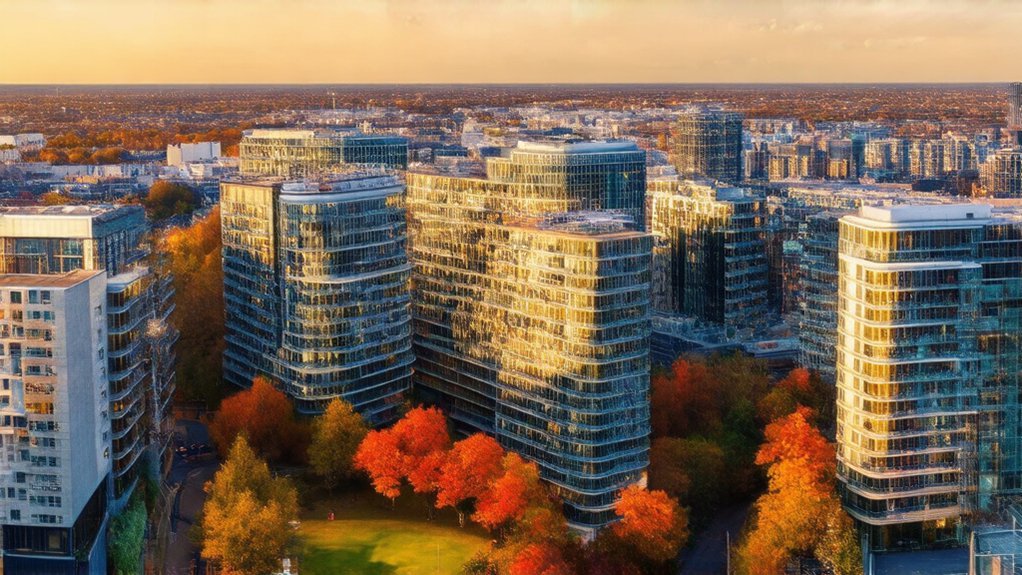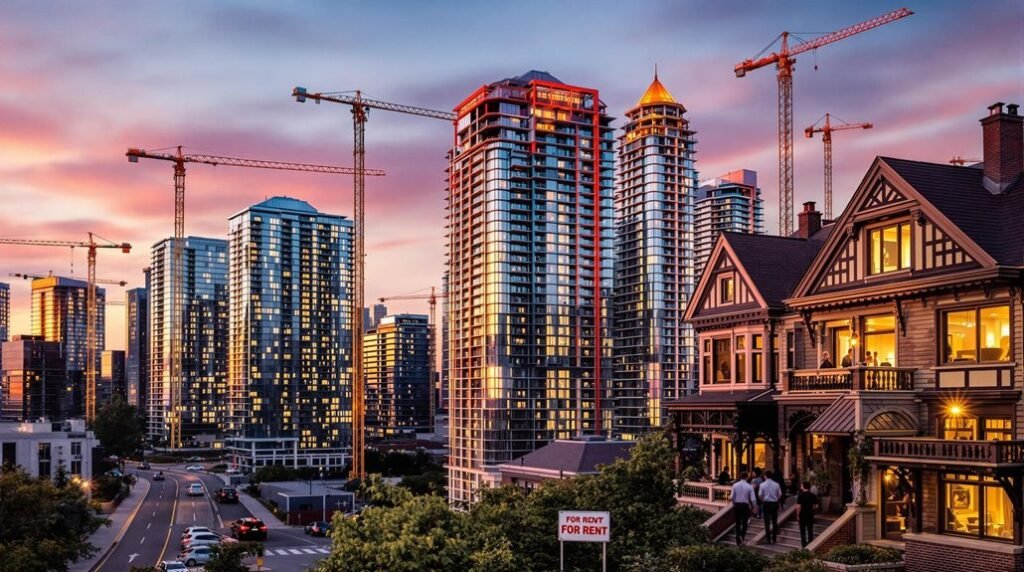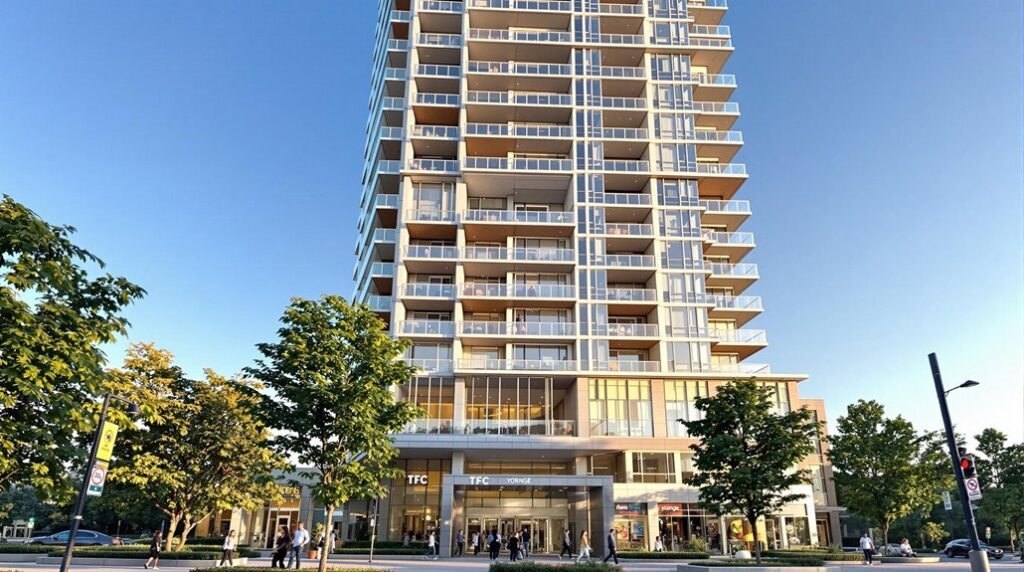When you’re buying property in North York, you’ll need to understand key legal requirements and processes. You’ll require a minimum 5% down payment for homes up to $500,000, and higher percentages for more expensive properties. A real estate lawyer will guide you through title searches, document preparation, and closing procedures. North York offers diverse property options including single-family homes in Bayview Village, condos along Yonge Street, and luxury estates in Bridle Path. Current market trends show an 11.8% price increase from last year, with one-bedroom condos averaging $528,000. The complex legal landscape of North York real estate contains many important details to explore.
Key Takeaways
- Legal property purchase in North York requires minimum down payments of 5-20% depending on purchase price and mortgage pre-approval.
- Title searches are mandatory and take 1-2 weeks, verifying ownership history, existing liens, and property boundaries.
- North York property types include single-family homes, condos along Yonge Street, and luxury properties in Bridle Path.
- Closing costs range from 1.5-4% of purchase price, including legal fees ($1,500-$3,000) and land transfer tax.
- Real estate lawyers manage document preparation, title verification, and ensure legal compliance throughout the transaction process.
Legal Requirements for Property Purchase

1. Financial Requirements:
You must have the minimum down payment ready. This means 5% for homes up to $500,000 and 10% for any portion between $500,000 and $999,999. For properties over $1 million, you’ll need 20% down. You’ll also need a mortgage pre-approval to understand your buying power. The First Home Savings Account lets you contribute up to $8,000 annually tax-deductible.
2. Purchase Agreement Process:
A real estate lawyer must review your purchase agreement. This document will include important conditions like financing approval and home inspection requirements. The seller must provide a clear title without any liens or legal issues. An experienced realtor with strong negotiation skills can help secure favorable terms in the agreement. Understanding your property rights is crucial before signing any documents.
3. Legal Professional Requirements:
Your lawyer will conduct a title search and verify ownership. They’ll review all legal documents and guarantee compliance with local regulations. They’ll also help you understand zoning laws and building codes that affect your property.
4. Tax Considerations:
You’ll need to budget for several taxes. The land transfer tax is due at closing. If you’re a non-resident buying in the Greater Golden Horseshoe Region, you’ll pay a 15% Non-Resident Speculation Tax. First-time homebuyers may qualify for tax rebates.
5. Additional Costs:
Plan for closing costs between 1.5% and 4% of the purchase price. Remember to factor in ongoing expenses like property taxes, utilities, and maintenance. Your budget should include all these costs to guarantee a successful purchase.
Common Property Types in North York
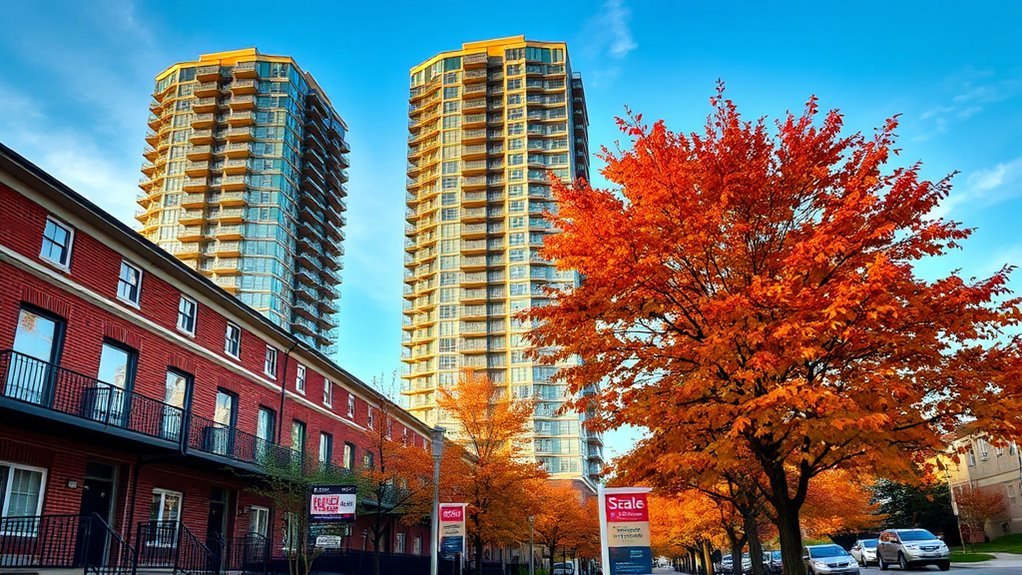
Across North York, you’ll find diverse property types suited for different lifestyles and budgets. The area offers four main categories of residential properties that cater to various needs and preferences.
1. Single-Family Homes
You’ll discover these properties primarily in Bayview Village and Lawrence Park North. These homes feature spacious yards and provide easy access to quality schools and parks. They’re perfect if you’re looking for privacy and room for family activities. Property values consistently show steady appreciation rates due to the area’s economic stability. Title insurance is particularly important for these higher-value properties to protect against future claims. Limited land availability and zoning restrictions continue to drive up the value of existing single-family homes.
2. Condos and Townhouses
These properties line Yonge Street and cluster around North York Centre. You’ll benefit from modern amenities and excellent transit access. Townhouses offer more space than condos while maintaining affordability. They’re especially attractive if you’re a young professional or investor.
3. Luxury Homes
You’ll find these prestigious properties in York Mills, Bridle Path, and Hogg’s Hollow. These neighborhoods feature expansive homes with lush landscapes and access to top-tier schools. Expect multimillion-dollar price tags and exclusive community amenities.
4. Rental Properties and Apartments
These make up about half of North York’s housing stock. You’ll see high concentrations along major roads and in areas like Flemingdon Park. The rental market serves students, young professionals, and new immigrants. Both high-rise and low-rise options are available throughout the district.
The ownership-to-rental ratio in North York is approximately even. You’ll find rental properties can provide strong investment returns. Property values vary considerably based on location amenities and building age.
Understanding Title Search Process

Before purchasing property in North York, you’ll need to complete a thorough title search – a critical legal process that examines public records to verify ownership and identify potential issues. Public records commonly include deeds and court documents that reveal the complete history of ownership transfers.
Your title search will reveal important details about the property’s history and any potential claims or liens that could affect your ownership rights. Professional title searches protect future transactions by ensuring the title is marketable and free from defects. Working with licensed real estate agents can provide valuable guidance through the complexities of title searches and legal requirements.
The title search process involves several key steps:
- Initial verification of the current owner’s legal right to sell
- Review of existing mortgages, liens, or other financial obligations
- Examination of the property’s ownership history or “chain of title”
- Confirmation of property boundaries and legal description
- Investigation of any court records or tax liens
You can expect the title search to take between one and two weeks for most residential properties in North York.
The timeline may extend if the property has a complex history or multiple ownership transfers. The cost of your title search will be included in your closing costs.
It’s essential to work with qualified professionals for your title search.
You’ll want to engage either a real estate lawyer or a title company to conduct this investigation.
These experts will:
- Order and review all necessary public records
- Examine land registry documentation
- Identify any potential issues with the title
- Verify all legal descriptions match the property
- Provide a detailed report of their findings
The results of your title search will help protect your investment by ensuring you’re receiving clear title to the property.
Any issues discovered during the search must be resolved before the sale can proceed.
Real Estate Lawyer Services

When you’re purchasing property in Toronto, a real estate lawyer will serve as your essential guide through the complex legal process. Your lawyer will manage critical responsibilities that protect your interests and guarantee a smooth transaction. Small firm attention combined with large firm expertise ensures personalized yet comprehensive service. For added convenience, mobile signing options are available to complete documents from your home or office.
Your real estate lawyer’s services can be broken down into four main categories:
- Information Gathering
- Reviews your purchase agreement thoroughly
- Investigates property claims and registered charges
- Checks property taxes and utility accounts
- Verifies zoning compliance
- Reviews survey certificates
- Document Management
- Prepares sales tax documents for chattels
- Arranges mortgage document signing
- Files required documents with land registry
- Reviews seller’s lawyer documents
- Creates statement of adjustments
- Financial Oversight
- Works directly with your mortgage lender
- Confirms sufficient financing for closing
- Manages mortgage payouts when needed
- Holds and transfers funds in trust
- Guides you through document signing
- Post-Sale Support
- Sends you detailed reporting documentation
- Confirms seller’s obligations are met
- Guarantees proper insurance coverage
- Assists with development issues if needed
- Handles any tenant-related matters
Your lawyer will coordinate with multiple parties including lenders, sellers’ lawyers, and land registry offices. Title insurance is strongly recommended to protect against unforeseen property ownership issues.
They’ll protect your interests by conducting thorough due diligence and managing all legal aspects of your property purchase.
Remember that your lawyer’s expertise helps prevent future legal issues and guarantees your property rights are properly secured.
Closing Costs and Legal Fees

Understanding closing costs and legal fees represents one of the most essential aspects of Toronto real estate transactions. You’ll need to budget between 1.5% and 4% of your property’s purchase price to cover these expenses. For a $500,000 home, this means setting aside $7,500 to $20,000 in addition to your purchase price. Consulting with financial advisors early in the process can help ensure proper budget allocation for these expenses.
The most significant closing cost you’ll encounter is the land transfer tax. In Toronto, you’ll pay both provincial and municipal land transfer taxes. On a $500,000 property, expect to pay approximately $6,475 in land transfer taxes. First-time homebuyers may qualify for rebates to reduce this amount. Flat rate structures are increasingly common and help simplify your budgeting process.
Your real estate lawyer will charge between $1,500 and $3,000 plus tax for their services. These fees typically include:
- Title searches to verify property ownership
- Document preparation and review
- Registration of the deed
- Coordination with your mortgage lender
- Final closing arrangements
Additional closing costs you’ll need to evaluate include property appraisal ($400-$500), home inspection ($400-$700), and title insurance. You’ll also need to pay property insurance and handle any tax adjustments with the municipality. Your market conditions may allow for negotiation with sellers to cover some of these costs.
The timing of these payments varies throughout your purchase process. You’ll submit your deposit (usually 5% of the purchase price) within 24 hours of offer acceptance.
Legal fees and land transfer taxes are due at closing. Home inspection fees are paid when the service is performed. Understanding these costs and their payment schedules helps you plan your finances effectively and avoid surprises during your property purchase.
Property Ownership Verification Steps

Proper property ownership verification protects you from potential legal complications long after you’ve handled your closing costs. The process involves several key steps you’ll need to follow through Ontario’s land registry system.
Your first step is to access the property records through OnLand, Ontario’s digital land registry platform. You can search using the Property Information Number (PIN), street address, or registration number. The Parcel Register will show you essential details about the property including its legal description and current owners.
Here are the main verification steps you’ll need to complete:
- Conduct a thorough title search through your lawyer to confirm the seller’s legal authority.
- Review the property’s ownership history which can trace back up to 200 years.
- Check for any existing liens, mortgages, or outstanding debts.
- Verify easements and rights of way that might affect the property.
- Confirm compliance with local zoning and land use regulations.
The Land Registry Office maintains official records that you’ll need to examine carefully. These include the property’s deed and any registered instruments or plans. Implementing strict identity verification measures helps protect against real estate fraud and unauthorized transactions. Since 1991, Teranet’s electronic system has been the official platform for land registration in Ontario.
You’ll want to verify the current homeowner’s identity and their percentage of ownership through the Parcel Register.
Remember that all property documents must be properly registered at the Land Registry Office. This registration helps protect your ownership rights and guarantees compliance with anti-money laundering laws.
It’s also vital to confirm that all outstanding debts are settled before closing the sale.
Mortgage Documents and Legal Review

A thorough mortgage document review protects both lenders and borrowers during real estate transactions in Toronto.
You’ll need to provide specific documentation to support your mortgage application. This includes government-issued photo ID and proof of your financial status through income statements and tax forms. Homeowners must obtain property insurance coverage before finalizing the mortgage. Personal meetings with borrowers are required to collect and verify identification documents. Working with a licensed mortgage broker can help streamline the document collection process and ensure all requirements are met.
Your lawyer will conduct several essential verification steps to guarantee a secure transaction:
- Review of your identification documents and confirmation of their authenticity
- Examination of recent property title transfers and any changes in value
- Analysis of financial records including bank statements and investment portfolios
- Verification of property ownership through title searches and on-site visits
- Assessment of all legal documents affecting your interest in the property
You’ll need to maintain a credit score above 600 and provide bank statements from the past two months.
Your lawyer will also review the agreement of purchase and sale along with any amendments. They’ll examine the parcel register for suspicious patterns or inactive instruments.
The legal review process requires specific documentation including:
- T4 tax forms and notice of assessment from the last two years
- Current pay stubs and employment verification letters
- Proof of assets and investments
- Mortgage pre-approval documentation
- Utility bills and property tax statements
Your lawyer must report any suspicious circumstances and obtain your written authorization before registering electronic documents.
They’ll submit a final report to the lender within 60 days including the duplicate registered mortgage. This thorough process helps protect your interests and guarantees compliance with all legal requirements.
Steps to Successful Property Transactions

Successful property transactions in Toronto require four major phases: pre-closing preparations, document preparation, closing procedures, and post-closing responsibilities.
Working with qualified real estate professionals is essential throughout these phases to navigate complexities successfully. OREA Form 100 standardizes the residential purchase agreement process. Having a mortgage pre-approval helps strengthen your offer and provides clear budget parameters.
In the pre-closing phase, you’ll need to complete several key steps:
- Provide personal information and sign a retainer agreement
- Review the Agreement of Purchase and Sale details
- Complete a title search to check for liens and easements
- Review the property survey if available
- Decide on ownership structure
During document preparation, your lawyer will:
- Address any buyer requisitions
- Prepare the transfer document
- Create a Statement of Adjustments
- Calculate closing balances
- Prepare mortgage payout statements
The closing day procedures include:
- Signing all required legal documents
- Transferring funds between parties
- Managing escrow requirements
- Conducting a final title search
- Registering the property transfer
You’ll need to complete these post-closing steps:
- Submit necessary reports to your lender
- Receive a final transaction report
- Verify all financial aspects
- Guarantee proper deed registration
- Confirm public registration details
Each phase requires careful attention to detail and proper timing. Your lawyer will guide you through these steps to guarantee a smooth transaction.
You’ll need to stay organized and responsive throughout the process. This systematic approach helps protect your interests and assures legal compliance in Toronto’s real estate market.
North York Market Considerations

Understanding North York’s real estate market requires careful evaluation of its unique dynamics and recent trends. The area has shown remarkable strength with an 11.8% price increase compared to last year. You’ll find one-bedroom condos reaching $528,000 and two-bedroom units selling at $698,400 as of July. Work-from-home trends are pushing more buyers to seek properties in this area compared to downtown Toronto. Legal representation from attorneys with local market expertise is essential for navigating complex transactions in this area.
The market’s competitiveness is evident in these key characteristics:
- Properties selling above list price especially one-bedroom units
- Multiple offer situations becoming increasingly common
- Hot properties going pending within 3-5 days
- Strong buyer interest from outside metros
- Premium prices in transit-oriented neighborhoods
North York’s market performance is closely tied to its infrastructure and location advantages. You’ll find Willowdale emerging as the most active neighborhood due to its excellent connectivity to major highways and public transit. The area’s proximity to the DVP, 401, and subway lines makes it particularly attractive to commuters. The vacancy rate decline in Toronto is driving more buyers to consider property ownership over renting.
Your timing matters in this market. Recent rate cuts have stimulated buyer activity leading to increased sales in October 2024.
You should note that while inventory levels remain elevated across the GTA you’ll still face competition for well-priced properties in desirable locations.
First-time homebuyers and downsizers find North York particularly appealing due to its balance of urban amenities and relative affordability. The area’s ongoing densification policy around mass transit hubs continues to drive development and maintain strong property values.
You’ll need to take these market dynamics carefully into account when planning your real estate transactions in North York.
Conclusion
When you’re ready to purchase property in North York, you’ll need to carefully follow Toronto’s real estate legal requirements. Work with a qualified real estate lawyer who can guide you through title searches, ownership verification, and mortgage document reviews. Don’t forget to budget for closing costs and legal fees. Understanding the local market trends and property types will help you make informed decisions and complete your transaction successfully.









